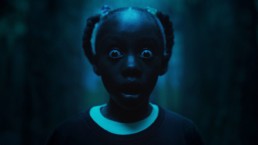‘Us’: An American Nightmare
With 'Us,' Jordan Peele continues to define the art form that intends to starts dialogues.
Last year’s Get Out ended up being more than just one of the scariest and wildly original movies of recent times: Jordan Peele’s first feature, about a group of African Americans who become enslaved through mind control after getting hypnotized by a family of wealthy Whites, became a pop cultural lightning rod for people to discuss the modern Black experience of living in America and the anxieties felt in Trump-era politics. As Ryan Rojas writes, Peele is back with a film that’s even more layered and focused towards expressing a sentiment that gets at the Black experience’s earliest historical roots of enslavement to an equally arresting degree (this review is spoiler-free).
For such a stunning achievement of a debut, it’s no wonder that audiences have been looking forward to whatever Peele’s follow-up film would be with feverish excitement. And now, Peele is back with another suspense thriller – Us – which is equally ambitious in its masterfully layered allegory
It’s this duality that makes Us work on two operatic levels: a familiar yet pulse-pounding set-up of a family trying to survive a home invasion, as well as a wildly conceptual existential dread-fest that ties in such gigantic conversations as race in America. When an African American family (a detail that isn’t relevant to the story until you think about it symbolically afterward) vacations at their beach house, haunting memories can’t help but pop up for Adelaide (Lupita Nyong’o), who remembers an experience she had when she, as a little girl back in 1986, wandered away from her family one night at the boardwalk, only to find herself face to face with another girl – her exact self. It’s enough to make for a traumatic childhood that makes her feel not quite herself, and sets the stage for years later when her family becomes the targets of home invaders – frighteningly and inconceivably enough, being each of their actual selves.
A family of four staring back at their exact opposites, they see these attackers all clad in red jumpsuits, brandishing scissors as weapons and noticeably all mute – except for Adelaide’s doppelgänger, Red (also played by Nyong’o). From there, it’s a story of the family trying to out-live their attackers, who aim to do away with them and take their place in this world. But of course, this being a Jordan Peele story (Peele also wrote and produced the film), the more we learn and the more that’s revealed, the audience is only taken deeper and deeper down the rabbit hole of what all ultimately can be seen as an allegory about American history and who we are as Americans, to an uncomfortable yet unflinching degree.
Peele, a previous funnyman whose background on the two iconic sketch shows Mad TV and Key and Peele helped shape him into the brilliant premise inventor that he is, proves more amazingly here that it’s his deep understanding of film history that makes him such a gifted talent (the Hitchcock comparisons have been flying his way as of late). While this review could spend even more time unpacking the visual references that are everywhere in the film and their significance (while still not touching on everything), quite simply put, Us is everything an audience could want in a movie. And one of the best parts is Peele marries his uncompromising vision with the mindset of being big-screen popcorn entertainment, giving Us the opportunity to be seen and discussed by people of all types. And this is what films – the best, paradigm-shifting films – are supposed to do. We should not only escape into something for 100 minutes and return to modern life unchanged, but come back from the experience more learned, or at the very least, willing to confront real-world discomforts. So beyond being one of the most unsettling films of this or any other recent year, Us achieves importance that will be recognized, re-watched, and discussed for years to come.
116 min. ‘Us’ is rated R for violence/terror, and language. Now playing in theaters.
Ryan Rojas
Ryan is the editorial manager of Cinemacy, which he co-runs with his older sister, Morgan. Ryan is a member of the Hollywood Critics Association. Ryan's favorite films include 2001: A Space Odyssey, The Social Network, and The Master.

